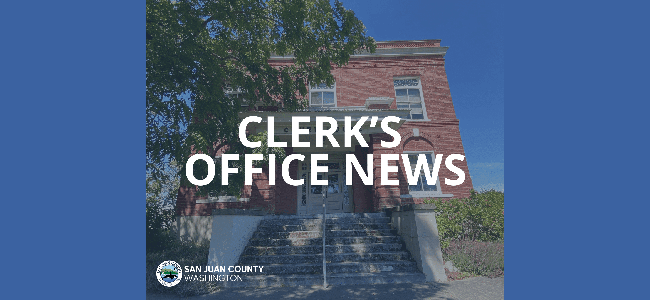— by Susan McBain, Orcas Issues reporter —
A long meeting on October 15 offered a lot of information for the commissioners of the Orcas Island Health Care District. The meeting began with a telephone discussion with consultants concerning the advantages of Federally Qualified Health Center (FQHC) Look-Alike status, and ended with an in-person presentation by representatives of Premera/LifeWise, which is replacing Kaiser in San Juan County as of January 1, in 2020.
In between these two discussions, the commissioners had their own long discussion of the District’s draft 2020 budget. The public hearing on the budget and final adoption are scheduled for the District’s next regular meeting on November 5, so the commissioners had decisions to make.
The draft budget included clearly described estimates of expected revenue and expenses, but no certainty about potential expenses that could be substantial, such as costs of a possible transition to FQHC status. The major question was whether the District should claim some of its “banked capacity” of $230,398 (the amount the District could have collected in its first year had the millage rate been set at the maximum of $0.75 per $1,000).
According to Commissioner Patty Miller’s five-year forecast, taking 75% of banked capacity, or $172,796, would keep the District’s cash flow positive through 2025, barring large unforeseen expenses. Without taking that capacity, cash flow would become negative in 2021. The commissioners voted 5–0 to use 75% of banked capacity in the budget and levy calculation. The levy rate would remain at approximately $0.65 per $1000 of assessed valuation. However, since the County’s total assessed valuation rose about 14% over last year’s, the overall amount levied would rise by the same percentage.
The FQHC consultants, Van Nielsen and Peter Theobald from Community Link Consulting, work with FQHCs and Look-Alikes throughout the country. In response to commissioner questions, they described the process for applying for FQHC designation from the federal Health Resources and Services Administration (HRSA) and for operating an FQHC.
- The District would need to create the FQHC as a separate nonprofit organization, develop required by-laws, and appoint a separate board, a majority of whom would be health center patients. Up to three District commissioners would also have seats on the board. That board and the District would sign a co-applicant agreement, and the agreement’s terms and the by-laws would be critical to the FQHC’s functioning.
- HRSA’s Compliance Manual outlines the requirements for an FQHC, including services to be offered (including dental and mental health) and a sliding fee scale. The health center must have offered services in compliance with the requirements for at least six months before the FQHC application is made.
- If HRSA approves the application, it then arranges for a site visit by three consultants to verify that health center operations meet requirements. The Operational Site Visit is conducted according to a Site Visit Protocol, through which details of services and the degree to which they address community needs are assessed. Only once the site visit is satisfactorily completed is an FQHC designation approved.
- The District’s earlier consultant, CPA Shar Sheaffer (see article on District’s October 2 meeting), estimated that FQHC status would add about $583,000 in annual revenue to current levels. However, given the length of the FQHC application and verification process, that increase would not occur until well into 2021 at the earliest.
- The 340B drug reimbursement program operates under a different agency, the Office of Pharmacy Affairs, and will require a separate process.
The representatives from Premera/LifeWise provided an overview of the organization, the process for those enrolling in plans through the WA Health Benefits Exchange to move from Kaiser to LifeWise, what constitutes in-network coverage, and air ambulance issues. Generally, they appeared willing to consider the special situation of coverage for islanders as flexibly as possible. They also described the possibility of grants from the Empire Health Foundation for medical equipment; the Foundation is administering funds that Premera set aside to supportrural communities.
The Town Hall planned for October 5 has been rescheduled to Monday, October 28, 5:30–7:30 p.m. in the Madrona Room at Orcas Center. The next regular District meeting is scheduled for Tuesday, November 5, at 5 p.m. at the Eastsound Fire Hall.
For readers interested in more detail about meetings, minutes of each meeting are available on the District website. Minutes of a meeting are posted soon after final approval by the commissioners, usually at their next meeting.
**If you are reading theOrcasonian for free, thank your fellow islanders. If you would like to support theOrcasonian CLICK HERE to set your modestly-priced, voluntary subscription. Otherwise, no worries; we’re happy to share with you.**








Nice concise and clear.
The Commission has located a couple of consultants that seem very knowledgeable and helpful and able to answer the first crop of many questions to come.
The Commissioners seem dedicated to engendering an administrative culture in an FQHC governing board as ‘on-task’ and as transparent as they are. This is not made explicit in the HSRA compliance documents and will be their own contribution, now that they have completed the trial run of setting up their own model governance procedures and policies successfully. It is an awful lot of work.
UW’s involvement according to the consultants, would as I understand, be accomplished through appointing a director with full authority to execute contracted services. Whether the UW management team’s fly-by-wire style is amenable to this constraint or the implicit exposure of their corporate culture to the demands of full transparency remain to be seen.
Integral to HRSA compliance are contracting with EMS and off-island institutional providers to ensure Continuity-of-Care. Implemented fully and functionally as an exemplar of a new cooperative professionalism, it could heal er,
~R E V O L U T I O N I Z E~
a tradition of wounded altruism and inappropriate/ obstructive practices plaguing an array of services constituting our local healthcare system and allied services.
Stay tuned.